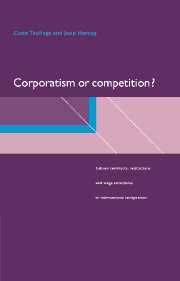 Corporatism or Competition?
Corporatism or Competition? Published online by Cambridge University Press: 23 November 2009
Introduction
As is documented in chapter 1, wages vary with tenure. And the evidence presented in chapter 1 also suggests that the importance of the tenure profiles differs substantially between countries. In the more decentralized economies, like the United States and Canada, tenure profiles are important. Their contribution to the variation in hourly wages is of the same order of magnitude as that of experience. In countries with more centralized institutions for wage setting, tenure profiles tend to be rather flat. In this chapter, these differentials in tenure profiles are analysed more thoroughly. In particular, we offer an explanation for the observed correlation between the importance of these profiles and wage-setting institutions. With the models discussed in chapter 4 and the empirical evidence in chapter 5 in mind, there is an obvious explanation. Both in the overlapping generations model of Weiss (1985) and the LIFO lay-off model of Kuhn and Roberts (1989), tenure profiles are a mechanism to extract rents from the firm. As the evidence in chapter 5 suggests rent sharing to be a more important phenomenon in decentralized economies, tenure profiles can be expected to be steeper in these economies.
There is a large caveat, however, as there is a lot of confusion about how to interpret the observed correlation between tenure and wages. Do workers command high wages due to long tenures, or is it the other way around, have workers long tenures because they command such high wages? Some economists (notably Abraham and Farber, 1987 and Altonji and Shakotko, 1987) have argued that the correlation between wages and tenure is mainly due to the latter effect.
To save this book to your Kindle, first ensure [email protected] is added to your Approved Personal Document E-mail List under your Personal Document Settings on the Manage Your Content and Devices page of your Amazon account. Then enter the ‘name’ part of your Kindle email address below. Find out more about saving to your Kindle.
Note you can select to save to either the @free.kindle.com or @kindle.com variations. ‘@free.kindle.com’ emails are free but can only be saved to your device when it is connected to wi-fi. ‘@kindle.com’ emails can be delivered even when you are not connected to wi-fi, but note that service fees apply.
Find out more about the Kindle Personal Document Service.
To save content items to your account, please confirm that you agree to abide by our usage policies. If this is the first time you use this feature, you will be asked to authorise Cambridge Core to connect with your account. Find out more about saving content to Dropbox.
To save content items to your account, please confirm that you agree to abide by our usage policies. If this is the first time you use this feature, you will be asked to authorise Cambridge Core to connect with your account. Find out more about saving content to Google Drive.